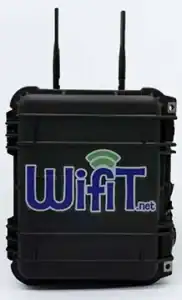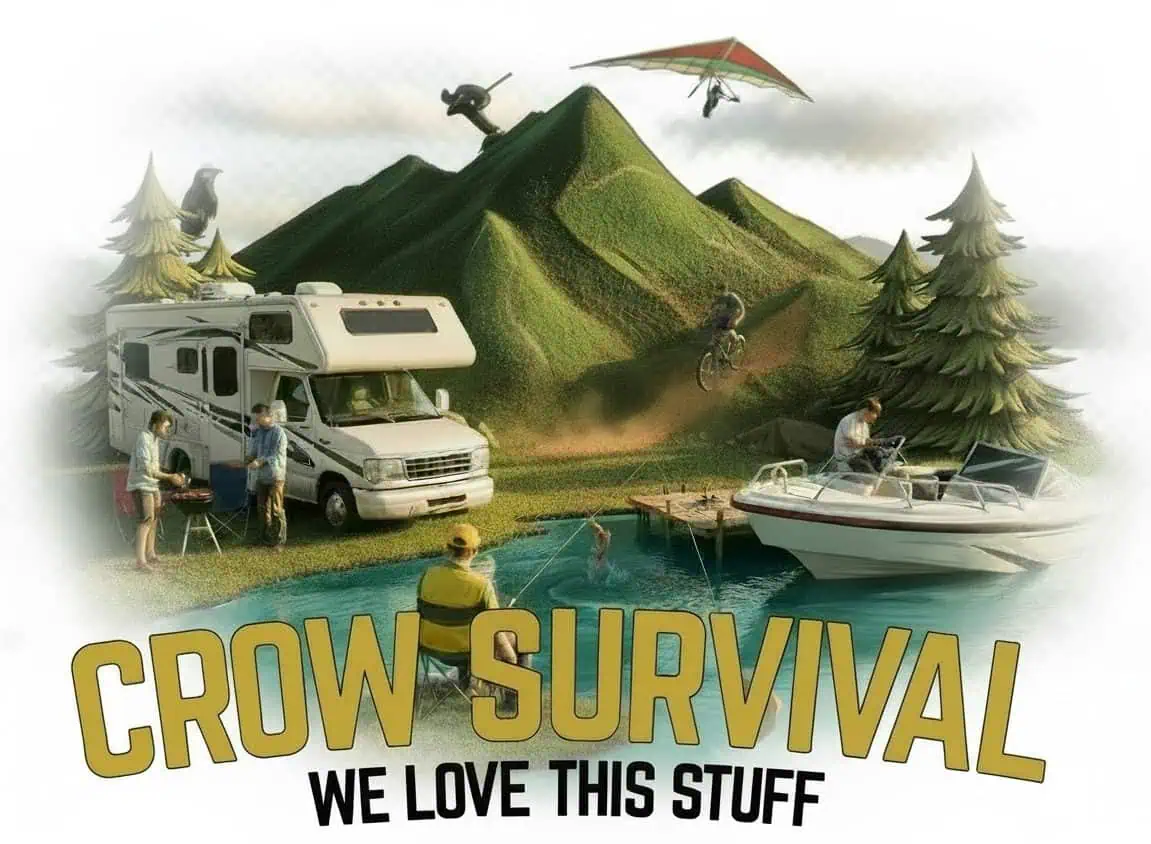
Thank you for reading our post, please rate this article at the end.
Reading Time: 7 minutesLast Updated on September 11, 2025 by Paul Clayton
Table of Contents
RV Travelers Guide to Satellite Internet Rental
Key Takeaways
-
- Connectivity is a Necessity: For modern RVers, internet access is no longer a luxury but a requirement for remote work, safety, navigation, and staying connected with family. Traditional options, such as campground Wi-Fi and cellular hotspots, are often unreliable in remote areas where many RVers travel.
- Satellite Rentals Offer a Solution: Satellite internet rental provides a flexible and powerful solution, delivering high-speed, low-latency service even in areas with limited connectivity. This model is particularly appealing for seasonal travelers who don’t want to commit to a long-term contract or purchase expensive equipment.
- A New RV Community: This technology is enabling a new generation of “digital nomads” and families to seamlessly blend travel with work, homeschooling, and content creation, transforming the RV lifestyle.
- The Future is Hybrid and Compact: The satellite internet industry is evolving with smaller, more portable equipment, global roaming capabilities, and hybrid systems that will automatically switch between satellite, 5G, and Wi-Fi to ensure uninterrupted connectivity.
The RV lifestyle has long been about romance the promise of driving scenic mountain roads, discovering backcountry desert trails, and waking up to a new horizon outside your window. It’s the call of the wild mixed with the comfort of home on wheels. But in the current era, that romance comes with a modern caveat: staying connected.
Whether you’re a remote worker, a digital expat, or a casual weekender, internet access can no longer be viewed as a perk it’s a requirement. That’s where satellite internet rental among RV travelers is beginning to make its mark.
 Why RV Travelers Require Secure Internet Connectivity
Why RV Travelers Require Secure Internet Connectivity
RVing has surged in popularity over the last decade, and the trend skyrocketed after 2020, when more people adopted both remote work and flexible travel lifestyles. According to the RV Industry Association (RVIA), more than 11 million households in the U.S. now own an RV, and a growing percentage of them live or work from their RVs full-time.
For these “road warriors,” connectivity means something far more critical than binge-watching Netflix at night. It’s about enabling the basics of modern life:
- Remote working: Attending Zoom calls, sharing documents, and keeping pace with
team projects while mobile. - Navigation & safety: Accessing GPS apps, weather warnings, and emergency
communication channels. - Community: Staying connected with family, friends, and fellow RVers on the journey.
- Entertainment: Streaming movies, playing online games, or uploading YouTube vlogs
from scenic campgrounds.
The catch? RV life often means camping well beyond the range of cell towers or dependable campground Wi-Fi.
- The Issue with Classic RV Internet Services Historically, RVers pieced together internet through a patchwork of unreliable options:
- Campground Wi-Fi: Free, but usually overloaded and painfully slow.
- Cellular hotspots: Useful in cities or suburbs, but the signal vanishes in rural or
mountainous areas. - RV park networks: Often weak, inconsistent, and insecure.
Campground Wi-Fi is a bit like sharing a straw with 200 people, one full-time RVer joked in an online forum. You might get a sip of internet here and there, but don’t expect a steady stream. While these workarounds might be acceptable for occasional use, they fall short when you’re deep in national parks, remote desert boondocking sites, or backcountry roads.
That’s where satellite internet rentals step in.
New vs. Used RV: Navigating the Price Trends
Can You Rent an RV for a Year?
How Satellite Internet Rentals Benefit RV Travelers
Satellite internet brings something that no cell tower can coverage where there is none. Beaming high-speed, low-latency service directly from satellites in orbit, these connections allow travelers to stay online even in the most remote wilderness.
- For RVers, the rental model is particularly attractive because it provides flexibility: Seasonal travelers, who don’t RV year-round, often avoid long-term contracts.
- Test before buying: Renters can trial satellite service before committing to equipment purchases.
- Big trips: Families or retirees planning a long cross-country drive may need more bandwidth just for that period.
By renting a temporary satellite internet solution for an RV instead of owning, RVers keep costs under control while still enjoying the same digital lifelines that make their lifestyle feasible.
A Day in the Life with Satellite Internet Access from the Roadside

Imagine this: You park your RV at a secluded forest camp. No cell bars, no campground Wi-Fi. In the past, this meant you were cut off from fun for a while, but a headache if you needed to check work emails, update your travel vlog, or contact family.
With a rented satellite internet kit, you set up a small dish, plug it in, and within minutes, you’re online. Suddenly you can:
- Hop on a video call with your team while enjoying the sounds of birds outside your window.
- Stream a family movie under the stars.
- Upload high-resolution photos from the Grand Canyon straight to your travel blog.
- Check weather forecasts before hitting the hiking trail.
Satellite rentals have turned dead zones into lifelines, says Laura Bennett, a Colorado-based digital nomad who RVs year-round. I can work a full day from a national park, then shut my laptop and step right outside into nature. It’s the best of both worlds.
The Growing Community of Networked RV Travelers
Satellite rentals aren’t just about convenience; they’re shaping a new kind of RV community. Increasingly, people are blending travel with work, homeschooling, or content creation.
- Families: Kids can continue online schooling from the road without disruption.
- Retirees: Staying in touch with children and grandchildren through FaceTime or WhatsApp.
- Solo adventurers: Having the reassurance of a reliable connection in case of
emergencies.
RV forums and Facebook groups are filled with stories of how temporary satellite rentals fuel these adventures. One user wrote, I thought I’d be offline the entire time we boondocked in Utah. Instead, I was able to teach my college class online from the RV. My students thought it was hilarious when a herd of deer wandered behind me during a Zoom session.
The trend is part of a broader digital nomad movement, which has grown significantly since the pandemic. According to MBO Partners’ 2023 State of Independence Report, there are now over 16.9 million Americans who identify as digital nomads, and RV living plays a growing role in that statistic.
Challenges and Considerations
Of course, satellite rentals aren’t perfect. Setup requires some space and a clear view of the sky. The weather can occasionally affect connections. Although prices have dropped in recent years, satellite rentals are still more expensive than traditional mobile hotspots.
Still, most RVers agree the tradeoff is worth it. It’s like paying for a seatbelt, notes David Kramer, an RV lifestyle blogger. You don’t think about the cost because you know it’s what keeps your lifestyle running smoothly.
Industry Trends and Insights
The satellite internet market has been evolving rapidly. Companies like SpaceX’s Starlink, Viasat, and HughesNet have increased speeds and reduced equipment sizes.
- Starlink’s low-earth orbit (LEO) satellites deliver latency as low as 25-40ms perfect
for video calls. - Traditional geostationary providers, like Viasat, are expanding coverage and offering
rental-friendly packages. - Portable “plug-and-play” kits are becoming more user-friendly, appealing to non-
technical RVers.
According to a Parks Associates report, over 41% of U.S. broadband households now view mobile connectivity as a top priority when traveling, a trend that directly fuels the demand for satellite rentals.
Looking Ahead: RV Connectivity in the Future

What does the future hold for RV connectivity? Experts see three major developments:
- Miniaturized equipment: Expect satellite dishes to shrink further, becoming as easy to mount as a bike rack.
- Global roaming: Seamless coverage across borders will become standard, eliminating headaches for travelers in Canada or Mexico.
- Hybrid systems: Devices that automatically switch between satellite, 5G, and campground Wi-Fi for uninterrupted connectivity.
In the next five years, the RV lifestyle will be as digitally connected as staying in a city apartment, predicts Mark Delaney, a telecom analyst. The difference is, your apartment will be parked by a lake or at the foot of a mountain.
For now, satellite internet rental remains the bridge between today’s adventures and tomorrow’s innovations. As WiFit.Net founder Matt Cicek puts it, Satellite internet rental for RV travelers is the connection that lets people chase horizons without cutting ties to the world that matters most.
The romance of RVing will always be about freedom, the freedom to choose your route, your pace, and your view each morning. But in today’s world, freedom also includes staying connected on your own terms. Satellite internet rentals offer exactly that: flexibility, security, and the ability to live, work, and play without compromise.
For families, professionals, retirees, and solo adventurers, it’s no longer just about where the road takes you; it’s about knowing you’ll always be able to share the journey once you get there.
Final Thoughts
The article concludes that satellite internet rentals bridge the gap between the classic freedom of RV travel and the modern need for digital connectivity. They offer a flexible and secure way for travelers to work, stay safe, and share their experiences from anywhere.
This technology is a key driver behind the growth of the digital nomad movement and is shaping the future of the RV lifestyle. For today’s adventurers, the ability to “chase horizons without cutting ties” is a powerful combination of freedom and connectivity.
Home page
Back to the top of the page





